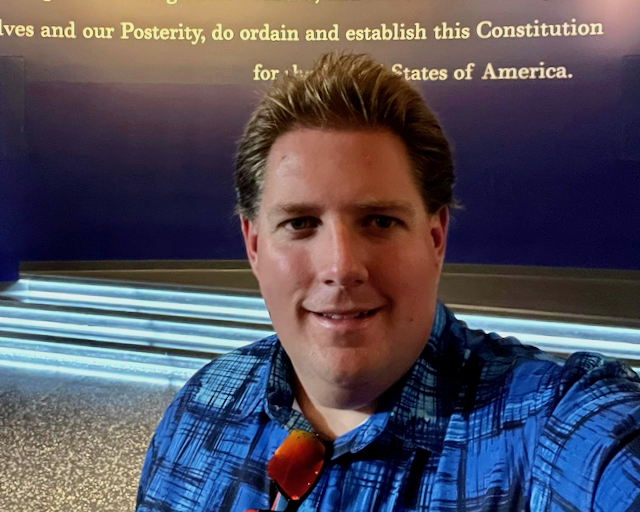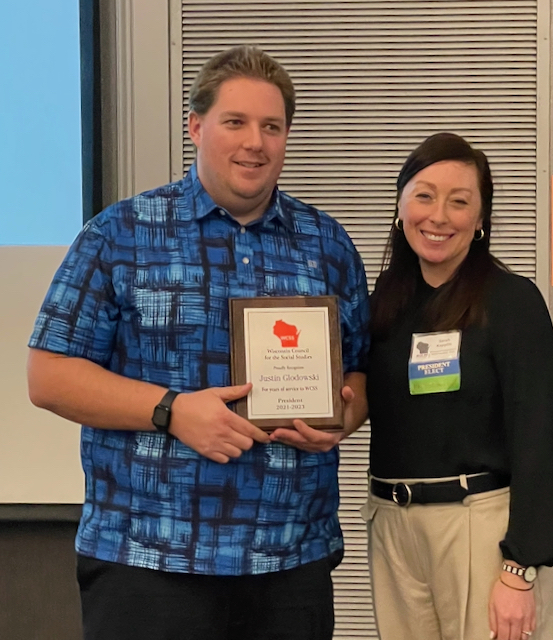Meet Our Teachers
Justin Glodowski

Justin Glodowski teaches at Marshfield High School in central Wisconsin. In his 13th year at the school, he currently teaches AP US government, AP Comparative Government, criminal justice, and the History of Genocide and Human Rights. He is a 2020 graduate of the Master of Arts with a Specialization in Teaching American History and Government (MASTAHG) program at Ashland University. He just completed a term as President of the Wisconsin Council for the Social Studies, an organization to which he has belonged since he was an undergraduate planning a teaching career. Glodowski was named 2023 Wisconsin History Teacher of the Year by the Gilder Lehrman Foundation. Because of his Masters study, Glodowski told us, he better understands history and government, and more effectively guides students in reasoning through their own opinions about politics.
I learned about the MASTAHG program from a colleague, Rhonda Watton, who studied in it and said good things about it. I didn’t want to travel for the degree, so I enrolled in the all-online version of the original Master of Arts in History and Government (MAHG) program. This allowed me to attend every class virtually. What appealed to me was the interactive online format. It wasn’t like the “discussion forum” you find in other online programs. You saw your fellow students on-screen and could actually converse with them in real time. It felt like a real class.
In TAH’s Masters Program, You Consider Others’ Perspectives

A “discussion forum” is a sort of whiteboard where you simply post your thoughts and wait to see if anyone responds. That format allows you to ignore other people’s thoughts; you pick and choose which things you want hear. But when you have a face-to-face meeting and actually talk with your fellow teachers, you have to consider their different perspectives. You also get a deeper interaction with your professors, because they discuss the topics with you.
The professors in the program were great. In my work with the Wisconsin Council for the Social Studies (WCSS), we’ve brought faculty from the MAHG program to our annual conference. Dr. Stephen Knott of the Naval War College gave a presentation on “The First Three Presidents” during the WCSS’ “Beyondference” Conference in 2021, a series of weekly professional development opportunities I organized during the pandemic. Knott gave a great talk and even interacted via Zoom with the teachers who attended. We made the series available to teachers throughout the US, and they really appreciated the opportunity to interact with a scholar like Knott when other opportunities were shut down.
Teaching advanced government classes, I use many primary documents, documents I now understand better because of my MASTAHG work. My students carefully analyze the Declaration of Independence and a number of the Federalist Papers. We read these texts line by line, annotating key points and discussing them. Some of the eighteenth-century language is difficult. I can more precisely define important terms because of my Masters work, and I can bring in ideas that I gathered from fellow teachers and the professors in the program—ideas my students don’t necessarily think of. It is easier for me to draw out the implications of Jefferson’s words in the Declaration now that I’ve taken the Revolution course read other writings of Jefferson’s.
I found new documents for my teaching in the program—sources I’d never seen referenced in textbooks or even in the lesson plans that teachers present at social studies conferences. These documents revealed perspectives I was not aware of before.
We Go to History to Understand Government
It was helpful that the program integrated the study of history and government. Teaching government, you’re always thinking about history, but you bounce around in time. Today, we are discussing the framing of our Constitution, but the next unit will focus on federalism. We’ll discuss the roles of the federal and state governments, asking who should be in charge of what. Who should write marijuana laws? Should states or the federal government set the minimum wage? Students have little trouble arguing whether the minimum wage should be raised, kept the same, or abolished altogether, but they are not used to thinking about what part of government should have authority over the question. Studying the Constitution, they encounter the question for the first time. It’s played a big role in our history, but we’ll be digging into primary sources from the past several decades to see how it is answered today.
The unit plan I submitted to Gilder Lehrman after being nominated for the teaching award relates to both history and government. It concerns the women’s rights movement and focuses on the protest strategies women have used. In my class, students complete this unit after studying African American civil rights movements, so they’re already thinking about protest strategies. When students examine historical images of women protesting for the right to vote, they’re often a bit shocked by photos showing the rough treatment these women received from the government. Yet they make connections between the suffragettes’ strategies and the marching, picketing, and sit-ins used in other civil rights efforts.
Then students read the 1848 Declaration of Rights and Sentiments and compare it to the Declaration of Independence. The wording used in 1848 closely parallels that of 1776. Students realize that the Declaration of Independence, although not a legal document guaranteeing rights, has been a powerful tool in calling out injustice. It’s held in such high regard that those who feel oppressed have invoked it time and again. Often, students connect the Declaration of Sentiments to Frederick Douglas’ speech, “What to the Slave is the Fourth of July?” (another document that I am better prepared to teach because of my work in the MASTAHG program).
We talk about the fact that these movements don’t really ever end; they evolve. They address different areas where there may be inequality.
Self-Government Begins With Students Reasoning Through Their Own Opinions
I hope students walk out of my government class thinking of themselves not just as citizens of the United States, but as citizens of the world. As they take other classes, learning about the world through AP Comparative Government or the Genocide and Human Rights course, I hope they feel they can participate in something bigger, advocating for issues of global importance.
But first they must learn how to make valid arguments. Students can always look up random facts to support a particular point of view. But if they learn how to support their arguments with sound reasoning and relevant evidence, they’ve learned a skill that’s valuable beyond these walls.
I also hope they realize that citizens will always hold differing views on almost every issue, and that it is okay for views to differ. I hope they learn that listening to other points of view, trying to understand them, is to everyone’s benefit. You need to understand the opposing point of view if you want to make a reasoned argument for your own opinion. You may even see some merit in the other person’s position, and this might help you compromise in a way that benefits everyone.
Recently we discussed the death penalty. I asked them to leave their desks and range themselves from one side of the room to the other, based on whether or not they supported it. I asked for volunteers to raise their hands if they wanted to share their thoughts on capital punishment. Other students listened, and if they felt that the student speaking made a good point, they could move closer to that person. Many students found themselves moving away from the opposite sides of the room and toward the middle.
My students handle discussions of history and politics better than many adults I know. They are very passionate about their views, but they don’t devolve into name-calling. Instead, they try to explain themselves. For many, it is the first time an adult has asked their opinion—or signaled that their opinion actually matters. Of course they matter! Reasoning through their own opinions, students are participating in self-government.
